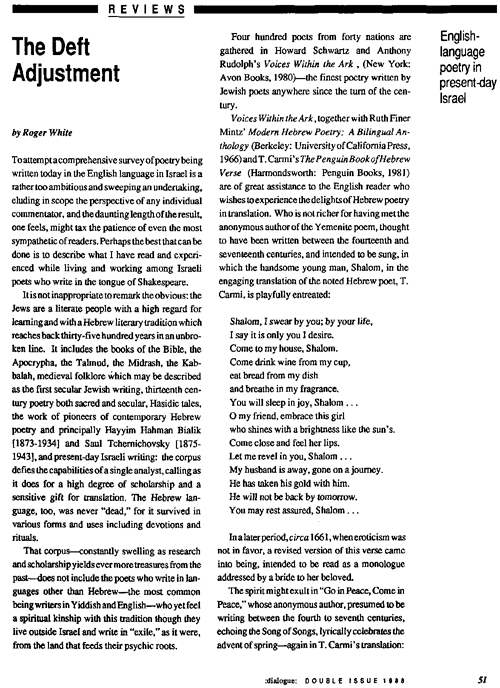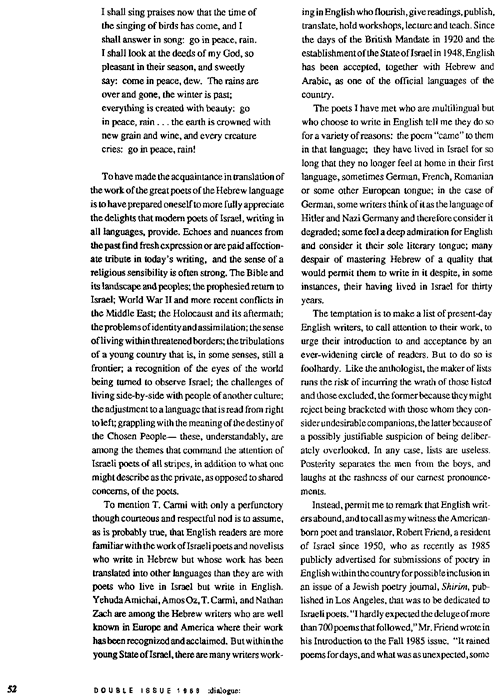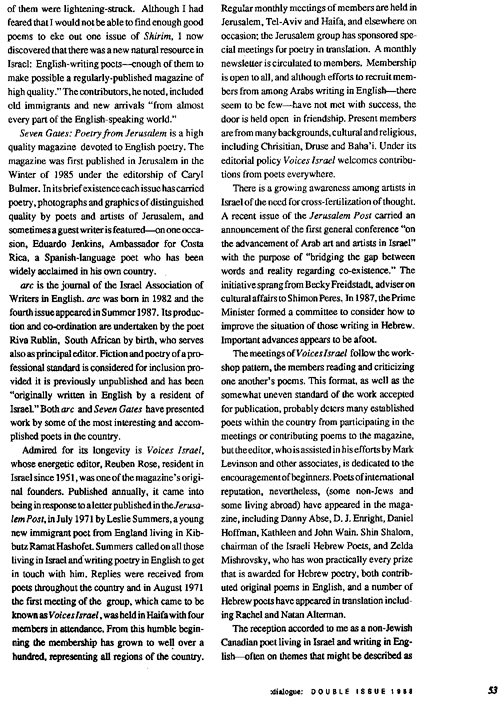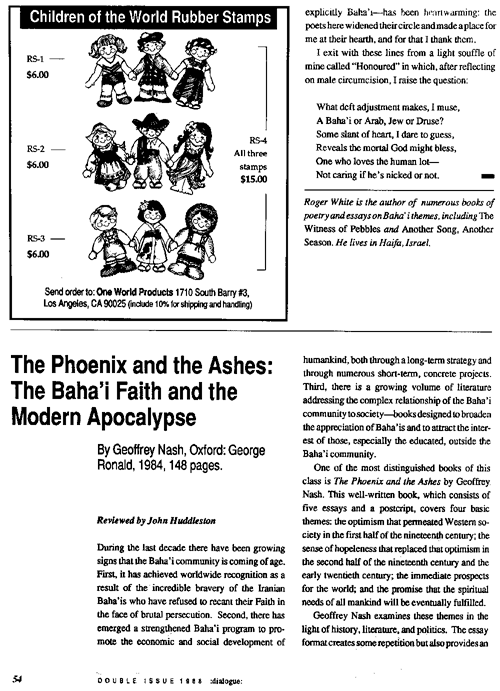
|
|
Abstract: Discussion of Israeli and Jewish poems, and reviews of the books Voices within the Ark, Modern Hebrew Poetry, Penguin Book of Hebrew Verse, Seven Gates: Poetry from Jerusalem, and Voices Israel. Notes: See also list of dialogue articles or image scans. |
The Deft Adjustment:
English-language poetry in present-day Israel
by Roger White
published in dialogue, 2:2-3, pages 51-54Los Angeles: 1988
It is not appropriate to remark the obvious: the Jews are a literate people with a high regard for learning and with a Hebrew literary tradition which reaches back thirty-five hundred years in an unbroken line. It includes the books of the Bible, the Apocrypha, the Talmud, the Midrash, the Kabbalah, medieval folklore which may be described as the first secular Jewish writing, thirteenth century poetry both sacred and secular, Hasidic tales, the work of pioneers of contemporary Hebrew poetry and principally Hayyim Hahman Bialik [1873-1934] and Saul Tchernichovsky [1875-1943], and present-day Israeli writing: the corpus defies the capabilities of a single analyst, calling as it does for a high degree of scholarship and a sensitive gift for translation. The Hebrew language, too, was never “dead,” for it survived in various forms and uses including devotions and rituals.
That corpus—constantly swelling as research and scholarship yields ever more treasures from the past—does not include the poets who write in languages other than Hebrew—the most common being writers in Yiddish and English—who yet feel a spiritual kinship with this tradition though they live outside Israel and write in “exile,” as it were, from the land that feeds their psychic roots.
Four hundred poets from forty nations are gathered in Howard Schwartz and Anthony Rudolph’s Voices Within the Ark, (New York: Avon Books, 1980)—the finest poetry written by Jewish poets anywhere since the turn of the century.
Voices Within the Ark, together with Ruth Finer Mintz’ Modern Hebrew Poetry: A Bilingual Anthology (Berkeley: University of California Press, 1966) and T. Carmi’s The Penguin Book of Hebrew verse (Harmondsworth: Penguin Books, 1981) are of great assistance to the English reader who wishes to experience the delights of Hebrew poetry in translation. Who is not richer for having met the anonymous author of the Yemenite poem, thought to have been written between the fourteenth and seventeenth centuries, and intended to be sung, in which the handsome young man, Shalom, in the engaging translation of the noted Hebrew poet, T. Carmi, is playfully entreated:
- Shalom, I swear by you; by your life,
I say it is only you I desire.
Come to my house, Shalom.
Come drink wine from my cup,
eat bread from my dish
and breathe in my fragrance.
You will sleep in joy, Shalom…
O my friend, embrace this girl
who shines with a brightness like the sun’s
. come close and feel her lips.
Let me revel in you, Shalom…
My husband is away, gone on a journey.
He has taken his gold with him.
He will not be back by tomorrow.
You may rest assured, Shalom….
In a later period, circa 1661, when eroticism was not in favor, a revised version of this verse came into being, intended to be read as a monologue addressed by a bride to her beloved.
The spirit might exult in “Go in Peace, Come in Peace,” whose anonymous author, presumed to be writing between the fourth to seventh centuries, echoing the Song of Songs, lyrically celebrates the advent of spring—again in T. Carmi’s translation:
- I shall sing praises now that the time of
the singing of birds has come, and I
shall answer in song: go in peace, rain.
I shall look at the deeds of my God, so
pleasant in their season, and sweetly
say: come in peace, dew. The rains are
over and gone, the winter is past;
everything is created with beauty: go
in peace, rain…the earth is crowned with
new grain and wine, and every creature
cries: go in peace, rain!
To have made the acquaintance in translation of the work of the great poets of the Hebrew language is to have prepared oneself to more fully appreciate the delights that modern poets of Israel, writing in all languages, provide. Echoes and nuances from the past find fresh expression or are paid affectionate tribute in today’s writing, and the sense of a religious sensibility is often strong. The Bible and its landscape and peoples: the prophesied return to Israel; World War II and more recent conflicts in the Middle East; the Holocaust and its aftermath; the problems of identity and assimilation; the sense of living within threatened borders; the tribulations of a young country that is, in some senses, still a frontier; a recognition of the eyes of the world being turned to observe Israel; the challenges of living side-by-side with people of another culture; the adjustment to a language that is read from right to left; grappling with the meaning of the destiny of the Chosen People—these, understandably, are among the themes that command the attention of Israeli poets of all stripes, in addition to what one might describe as the private, as opposed to shared concerns, of the poets.
To mention T. Carmi with only a perfunctory though courteous and respectful nod is to assume, as is probably true, that English readers are more familiar with the work of Israeli poets and novelists who write in Hebrew but whose work has been translated into other languages than they are with poets who live in Israel but write in English. Yehuda Amichai, Amos Oz, T. Carmi, and Nathan Zach are among the Hebrew writers who are well known in Europe and America where their work has been recognized and acclaimed. But within the young State of Israel, there are many writers working in English who flourish, give readings, publish, translate, hold workshops, lecture and teach. Since the days of the British Mandate in 1920 and the establishment of the State of Israel in 1948, English has been accepted, together with Hebrew and Arabic, as one of the official languages of the country.
The poets I have met who are multilingual but who choose to write in English tell me they do so for a variety of reasons: the poem “came” to them in that language; they have lived in Israel for so long that they no longer feel at home in their first language, sometimes German, French, Romanian or some other European tongue; in the case of German, some writers think of it as the language of Hitler and Nazi Germany and therefore consider it degraded; some feel a deep admiration for English and consider it their sole literary tongue; many despair of mastering Hebrew of a quality that would permit them to write in it despite, in some instances, their having lived in Israel for thirty years.
The temptation is to make a list of present-day English writers, to call attention to their work, to urge their introduction to and acceptance by an ever-widening circle of readers. But to do so is foolhardy. Like the anthologist, the maker of lists runs the risk of incurring the wrath of those listed and those excluded, the former because they might reject being bracketed with those whom they consider undesirable companions, the latter because of a possibly justifiable suspicion of being deliberately overlooked. In any case, lists as useless. Posterity separates the men from the boys, and laughs at the rashness of our earnest pronouncements.
Instead, permit me to remark that English writers abound, and to call as my witness the American-born poet and translator, Robert Friend, a resident of Israel since 1950, who as recently as 1985 publicly advertised for submissions of poetry in English within the country for possible inclusion in an issue of a Jewish poetry journal, Shirim, published in Los Angeles, that was to be dedicated to Israeli poets. “I hardly expected the deluge of more than 700 poems that followed,” Mr. Friend wrote in his Introduction to the Fall 1985 issue. “It rained poems for days, and what was as unexpected, some of them were lightening-struck. Although I had feared that I would not be able to find enough good poems to eke out one issue of Shirim, I now discovered that there was a new natural resource in Israel: English-writing poets—enough of them to make possible a regularly-published magazine of high quality.” The contributors, he noted, included old immigrants and new arrivals “from almost every part of the English-speaking world.”
Seven Gates: Poetry from Jerusalem is a high quality magazine devoted to English poetry. The magazine was first published in Jerusalem in the Winter of 1985 under the editorship of Caryl Bulmer. In its brief existence each issue has carried poetry, photographs and graphics of distinguished quality by poets and artists of Jerusalem, and sometimes a guest writer is featured—on one occasion, Eduardo Jenkins, Ambassador for Costa Rica, a Spanish-language poet who has been widely acclaimed in his own country.
arc is the journal of the Israel Association of Writers in English. arc was born in 1982 and the fourth issue appeared in Summer 1987. Its production and co-ordination are undertaken by the poet Riva Rublin, South African by birth, who serves also as principal editor. Fiction and poetry of a professional standard is considered for inclusion provided it is previously unpublished and has been “originally written in English by a resident of Israel.” Both arc and Seven Gates have presented work by some of the most interesting and accomplished poets in the country.
Admired for its longevity is Voices Israel, whose energetic editor, Reuben Rose, resident in Israel since 1951, was one of the magazine’s original founders. Published annually, it came into being in response to a letter published in the Jerusalem Post, in July 1971 by Leslie Summers, a young new immigrant poet from England living in Kibbutz Ramat Hashofet. Summers called on all those living in Israel and writing poetry in English to get in touch with him. Replies were received from poets throughout the country and in August 1971 the first meeting of the group, which came to be known as Voices Israel, was held in Haifa with four members in attendance. From this humble beginning the membership has grown to well over a hundred, representing all regions of the country. Regular monthly meetings of members are held in Jerusalem, Tel-Aviv and Haifa, and elsewhere on occasion; the Jerusalem group has sponsored special meetings for poetry in translation. A monthly newsletter is circulated to members. Membership is open to all, and although efforts to recruit members from among Arabs writing in English—there seem to be few—have not met with success, the door is held open in friendship. Present members are from many backgrounds, cultural and religious, including Christian, Druse and Bahá'í. Under its editorial policy Voices Israel welcomes contributions from poets everywhere.
There is a growing awareness among artists in Israel of the need for cross-fertilization of thought. A recent issue of the Jerusalem Post carried an announcement of the first general conference “on the advancement of Arab art and artists in Israel” with the purpose of “bridging the gap between words and reality regarding co-existence.” The initiative sprang from Becky Freidstadt, adviser on cultural affairs to Shimon Peres. In 1987, the Prime Minister formed a committee to consider how to improve the situation of those writing in Hebrew. Important advances appears to be afoot.
The meetings of Voices Israel follow the workshop pattern, the members reading and criticizing one another’s poems. This format, as well as the somewhat uneven standard of the work accepted for publication, probably deters many established poets within the country from participating in the meetings or contributing poems to the magazine, but the editor, who is assisted in his efforts by Mark Levinson and other associates, is dedicated to the encouragement of beginners. Poets of international reputation, nevertheless, (some non-Jews and some living abroad) have appeared in the magazine, including Danny Abse, D. J. Enright, Daniel Hoffman, Kathleen and John Wain. Shin Shalom, chairman of the Israeli Hebrew Poets, and Zelda Mishrovsky, who has won practically every prize that is awarded for Hebrew poetry, both contributed original poems in English, and a number of Hebrew poets have appeared in translation including Rachel and Natan Alterman.
The reception accorded to me as a non-Jewish Canadian poet living in Israel and writing in English—often on themes that might be described as explicitly Bahá'í—has been heartwarming: the poets here widened their circle and made a place for me at their hearth, and for that I thank them.
I exit with these lines from a light soufflé of mine called “Honoured” in which, after reflecting on male circumcision, I raise the question:
- What deft adjustment makes, I muse,
A Bahá'í or Arab, Jew or Druse?
Some slant of heart, I dare to guess,
Reveals the mortal God might bless,
One who loves the human lot—
Not caring if he’s nicked or not.
Roger White is the author of numerous books of poetry and essays on Bahá'í themes, including The Witness of Pebbles and Another Song, Another Season. He lives in Haifa, Israel.
 click for larger image |
 click for larger image |
 click for larger image |
 click for larger image |
|
|